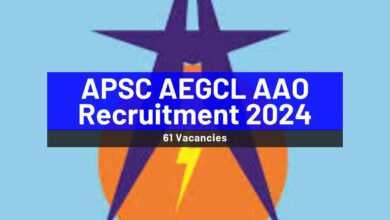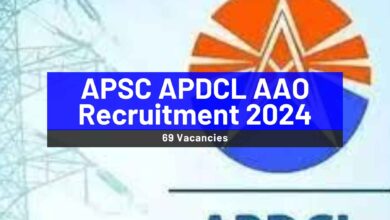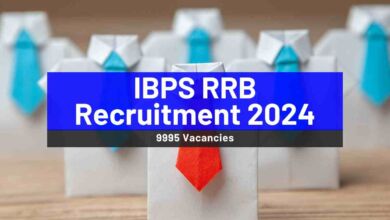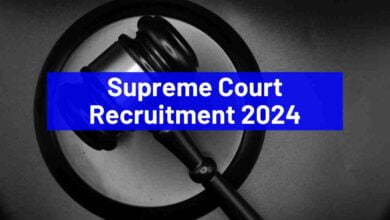SSC CGL 2024: Mega Vacancies of Over 17,500; Get All Exam-Related Details Here
Candidates can apply for SSC CGL 2024, which have opened up for more than 17,500 posts. All the examination related details are notified here.
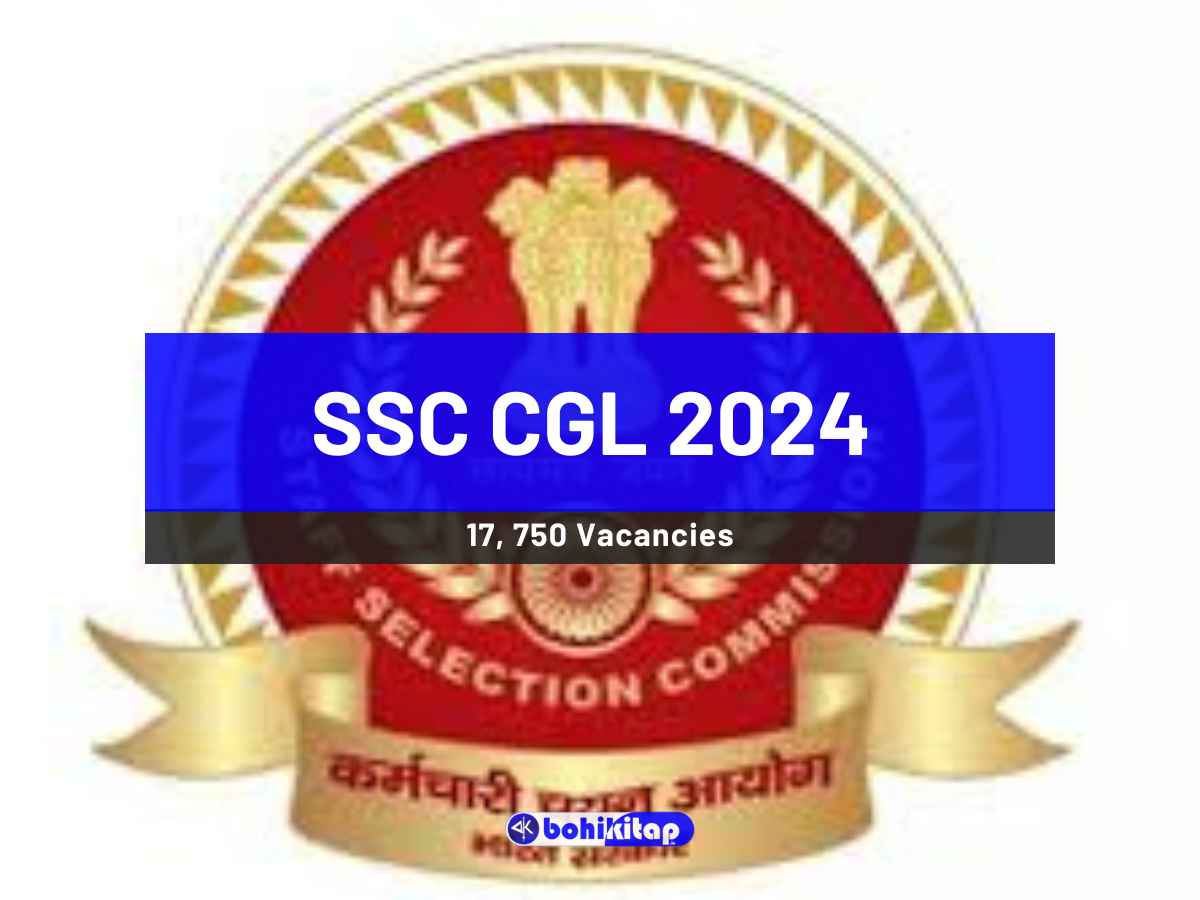
SSC CGL 2024: The Staff Selection Commission (SSC) released official notification of SSC CGL 2024 recruitment. It was been indicated that more than 15,000 vacancies will be posted across various departments, as per responses to RTI queries. However, the number of vacancies could exceed 17,500.
The upcoming vacancies offer a significant opportunity for job seekers, and prospective applicants are advised to stay updated with official SSC CGL 2024 notifications to get accurate and confirmed details about the recruitment process and available positions.
Also Read: APSC AEGCL AAO Recruitment 2024: Apply for 61 posts
Table of Contents
SSC CGL 2024: Vacancy Details
The list of posts under SSC CGL 2024 along with the departments, has been detailed below:
| Department | Post Name | No of Seats (Tentative) |
|---|---|---|
| Central Secretariat Service, Department of Personnel and Training (DOPT) | Assistant Section Officer | 930 |
| Ministry of External Affairs (Cadre Cell) | Assistant Section Officer | 120 |
| Central Board of Direct Taxes (CBDT), Department of Revenue, Ministry of Finance | Inspector of Income Tax | 411 |
| Central Board of Direct Taxes (CBDT), Department of Revenue, Ministry of Finance | Tax Assistant | 2259 |
| Central Board of Indirect Taxes & Customs (CBIC), Department of Revenue, Ministry of Finance | Inspector (CGST and excise officer) | 2664 |
| Central Board of Indirect Taxes & Customs (CBIC), Department of Revenue, Ministry of Finance | Inspector (Preventive Officer) | 340 |
| Central Board of Indirect Taxes & Customs (CBIC), Department of Revenue, Ministry of Finance | Inspector (Examiner) | 145 |
| Central Board of Indirect Taxes & Customs (CBIC), Department of Revenue, Ministry of Finance | Executive Assistant | 111 |
| Central Board of Indirect Taxes & Customs (CBIC), Department of Revenue, Ministry of Finance | Tax Assistant | 1620 |
| Department of Post‐SPN, Ministry of Communication | Inspector Posts | 55 |
| Ministry of Statistics & Programme Implementation | Junior Statistical Officer | 725 |
| Controller General of Defence Accounts (CGDA), Ministry of Defence | Auditor | 1799 |
| Department of Posts ‐ SPN, Ministry of Communication | Postal Assistant/ Sorter Assistant | 4098 |
| Central Bureau of Narcotics, Ministry of Finance | Upper Division Clerk | 40 |
| Central Bureau of Narcotics, Ministry of Finance | Sub Inspector | 18 |
| Narcotics Control Bureau, Ministry of Home Affairs | Sub Inspector/ Junior Intelligence Office | 15 |
Pay Scale
The remuneration for candidates selected in the SSC CGL 2024 will include salary and other allowances. The salary details are given below:
- Pay Level-7 Rs 44900 to Rs 142400
- Pay Level-6 Rs 35400 to 112400
- Pay Level-5 Rs 29200 to 92300
- Pay Level-4 Rs 25500 to 81100
Eligibility
The candidates applying for SSC CGL 2024 must be either a citizen of India, a subject of Nepal, a subject of Bhutan, or a person of Indian origin who has migrated from Pakistan, Burma, Sri Lanka, East African countries of Kenya, Uganda, the United Republic of Tanzania (formerly Tanganyika and Zanzibar), Zambia, Malawi, Zaire, Ethiopia, or Vietnam intending to settle in India permanently.
Candidates belonging to the categories of a subject of Nepal, a subject of Bhutan, or a person of Indian origin from the specified countries must have a certificate of eligibility issued by the Government of India. A candidate requiring a certificate of eligibility may be admitted to the examination, but the offer of appointment will be given only after the necessary eligibility certificate has been issued.
Age
The candidates applying for SSC CGL 2024 should have certain age criteria as given below:
| Age Limit | Remarks |
|---|---|
| For the posts for which the age limit is 18-27 years | Candidate must have been born not earlier than 02-08-1997 and not later than 01-08- 2006. |
| For the posts for which the age limit is 20-30 years | Candidate must have been born not earlier than 02-08-1994 and not later than 01-08- 2004. |
| For the posts for which the age limit is 18-30 years | Candidate must have been born not earlier than 02-08-1994 and not later than 01-08- 2006. |
| For the posts for which the age limit is18-32 years | Candidate must have been born not earlier than 02-08-1992 and not later than 01-08- 2006. |
Relaxations in the upper age limit shall be as given below
- SC/ ST: 5 years
- OBC/ MOBC: 3 years
- PwBD: 10 years
Educational Criteria
| Post | Essential Educational Criteria | Desirable Educational Criteria |
|---|---|---|
| Junior Statistical Officer | Bachelor’s Degree in any subject from a recognized University or Institute, 60% Marks in Mathematics at the 12th standard level Or Bachelor’s Degree in any subject with Statistics as one of the subjects at the degree level. | |
| Statistical Investigator Grade-II | Bachelor’s Degree in any subject from a recognized University or Institute, Statistics must be a subject in all three years or all six semesters of the graduation course. | |
| Research Assistant in National Human Rights Commission (NHRC) | Bachelor’s Degree from a recognized University or Institute. | Minimum of one year of research experience in any recognized university or recognized Research Institution |
| All other Posts | Degree in Law or Human Rights*from a recognized university |
Selection procedure and Examination pattern of SSC CGL 2024
Before applying for recruitment and starting exam preparation, all candidates must be thoroughly familiar with the SSC CGL Syllabus and Exam Pattern 2024. According to the previous recruitment cycle, the SSC CGL Exam Pattern includes examinations conducted in two tiers. In the Tier-1 exam, candidates will answer 100 questions worth a total of 200 marks. Tier 2 involves three papers, which vary based on the post applied for.
SSC CGL 2024 Tier 1 examination
- The SSC CGL Tier 1 exam consists of four sections: General Intelligence & Reasoning, English Language & Comprehension, Quantitative Aptitude, and General Awareness.
- It is conducted in online mode, this exam comprises 100 questions totalling 200 marks, with a duration of 60 minutes.
- For each negative answer, 0.5 marks will be deducted.
- For unanswered questions, no answer will be deduced.
- There is no sectional time limit in the Tier-1 exam. It is qualifying, and the marks will not be included in the final selection.
| Section | No. of Question | Total Marks |
|---|---|---|
| General Intelligence and Reasoning | 25 | 50 |
| General Awareness | 25 | 50 |
| Quantitative Aptitude | 25 | 50 |
| English Comprehension | 25 | 50 |
| Total | 100 | 200 |
SSC CGL 2024 Tier 2 examination
- The SSC CGL Tier-2 exam is divided into three phases: Paper 1, Paper 2, and Paper 3.
- Paper 1 is mandatory for all candidates, while Paper 2 is for those applying for the Junior Statistical Officer (JSO) position in the Ministry of Statistics and Programme Implementation.
- Paper 3 is for candidates applying for the Assistant Audit Officer/ Assistant Accounts Officer posts.
- There is a negative marking of 1 mark for each incorrect answer in Section-I, Section-II, and Module-I of Section-III of Paper 1, and a deduction of ½ mark for each wrong answer in Papers 2 and 3.
- Tier-2 exams are conducted in multiple stages, with Paper 1 held in two sessions (Session I and Session II) on the same day in two separate shifts.
| Section | Time Allotted | Total Marks |
|---|---|---|
| Paper 1 – Compulsory paper | 2.5 hours | 360 + Data entry task marks |
| Paper 2 – Junior Statistical Officer (JSO) | 2 hours | 200 |
| Paper 3 – Assistant Audit Officer/ Assistant Accounts Officer | 2 hours | 200 |
| Total | 8.5 hours | 760 + Data entry task marks |
Paper 1
Subject | Number of Questions | Maximum Marks | Weightage | Time Allotted |
|---|---|---|---|---|
| Section 1 – Module I: Mathematical Abilities | 30 | 90 | 23% | 60 minutes (80 minutes for scribe candidates) |
| Section 1 – Module II: Reasoning and General Intelligence | 30 | 90 | 23% | |
| Section 2 – Module I: English Language and Comprehension | 45 | 135 | 35% | 60 minutes (80 minutes for scribe candidates) |
| Section 2 – Module II: General Awareness | 25 | 75 | 15% | |
| Section 3 – Module I: Computer Knowledge Module | 20 | 60 | – | 15 Minutes (20 minutes for scribe candidates) |
| Section 3 – Module-II: Data Entry Speed Test Module – 2000 Key Depressions | – | – | – | 15 Minutes (20 minutes for scribe candidates) |
| Total | 150 | 450 | 2.5 hours |
Paper 2 and Paper 3
| Paper | Subject | Number of Questions | Maximum Marks | Time Allotted |
|---|---|---|---|---|
| 2 | Statistics | 100 | 200 | 2 Hours (2 hours 40 minutes for scribe candidates) |
| 3 | Finance & Economics | 100 | 200 | 2 Hours (2 hours 40 minutes for scribe candidates) |
| Total | 200 | 400 | 4 hours (5 hours 20 minutes for scribe candidates) |
Syllabus and Book Recommendation of SSC CGL 2024
The comprehensive syllabus and top book recommendations for SSC CGL 2024 are designed to help students excel in every section of the exam. The students can equip the right resources and strategies to ensure success in your preparation journey.
Tier 1
The SSC CGL Tier 1 exam consists of four sections: General Intelligence & Reasoning, English Language & Comprehension, Quantitative Aptitude, and General Awareness. The detailed syllabus and book recommended are given below:
| Section | Syllabus |
|---|---|
| General Intelligence and Reasoning | Spatial Orientation, Discrimination, Semantic Classification, Problem-Solving, Space Orientation, Indexing, Critical Thinking, Observation, Coding and Decoding, Symbolic/ Number Classification, Word Building, Space Visualization, Address Matching, Emotional Intelligence, Analysis, Relationship Concepts, Statement Conclusion, Figural Classification, Syllogistic Reasoning, Venn Diagrams, Date and City Matching, Social Intelligence, and Non-Verbal Series |
| General Awareness | India and its neighbouring countries, particularly in relation to History, Culture, Geography, Economic Scene, General Policy, and Scientific Research. Additional subjects include Science, Current Affairs, Books and Authors, Sports, Important Schemes, Important Days, Portfolio, People in News, and Static GK. |
| Quantitative Aptitude | Discount, Graphs of Linear Equations, Common Tangents to Two or More Circles, Right Circular Cylinder, Degree and Radian Measures, Ratio and Proportion, Partnership Business, Triangle and Its Various Kinds of Centers, Triangle and Quadrilaterals, Sphere, Standard Identities, Square Roots, Mixture and Alligation, Congruence and Similarity of Triangles, Regular Polygons, Hemispheres, Complementary Angles, Bar Diagram and Pie Chart, Percentage, Time and Distance, Rectangular Parallelepiped, Heights and Distances, Interest, Time and Work, Tangents, Right Prism, Regular Right Pyramid with Triangular or Square Base, Histogram, Profit and Loss, Basic Algebraic Identities of School Algebra and Elementary Surds, Angles Subtended by Chords of a Circle, Right Circular Cone, Trigonometric Ratio, Frequency Polygon, Circle and Its Chords, and Averages. |
| English Comprehension | Idioms and Phrases, One Word Substitution, Sentence Correction, Error Spotting, Fill in the Blanks, Spelling correction, Reading Comprehension, Synonyms and Antonyms, Active Passive, Sentence Rearrangement, Sentence Improvement, and Cloze Test. |
Tier 2
The SSC CGL Tier-2 exam is divided into three phases: Paper 1, Paper 2, and Paper 3. Paper 1 is mandatory for all candidates, while Paper 2 is for those applying for the Junior Statistical Officer (JSO) position in the Ministry of Statistics and Programme Implementation.
Paper 1
| Subject | Syllabus |
|---|---|
| Section 1 – Module I: Mathematical Abilities | The topics cover Number Systems, including the Computation of Whole Numbers, Decimals and Fractions, and the Relationship between Numbers, as well as Fundamental Arithmetical Operations. In Arithmetic, subjects such as Percentages, Ratio and Proportion, Square Roots, Averages, Interest (Simple and Compound), Profit and Loss, Discount, Partnership Business, Mixture and Alligation, Time and Distance, and Time and Work are included. In Algebra, focus areas include Basic Algebraic Identities of School Algebra, Elementary Surds, and Graphs of Linear Equations. Geometry topics include Familiarity with Elementary Geometric Figures and Facts such as Triangles and Their Various Centers, Congruence and Similarity of Triangles, Circles and Its Chords and Tangents, Angles Subtended by Chords of a Circle, and Common Tangents to Two or More Circles. Mensuration topics encompass Triangles, Quadrilaterals, Regular Polygons, Circle, Right Prism, Right Circular Cones, Right Circular Cylinders, Sphere, Hemispheres, Rectangular Parallelepiped, and Regular Right Pyramid with Triangular or Square Bases. Trigonometry includes Trigonometric Ratios, Complementary Angles, Heights and Distances (simple problems only), and Standard Identities like sin²θ + cos²θ = 1. Statistics and Probability Use of Tables and Graphs (Histogram, Frequency Polygon, Bar Diagram, Pie Chart), Measures of Central Tendency (mean, median, mode, standard deviation), and Calculation of Simple Probabilities. |
| Section 1 – Module II: Reasoning and General Intelligence | Symbolic/ Number Analogy, Venn Diagrams, Punched Hole/ Pattern Folding and Unfolding, Emotional Intelligence, Numerical Operations, Trends, Symbolic/ Number Classification, Semantic Series, Word Building, Figural Series, Figural Pattern Folding and Completion, and Embedded Figure. |
| Section 2 – Module I: English Language and Comprehension | Active/Passive Voice of Verbs, Conversion into Direct/Indirect Narration, Shuffling of Sentence Parts, Shuffling of Sentences in a Passage, Cloze Passage, Spelling/Detecting Misspelled Words, Idioms and Phrases, Homonyms, Spot the Error, Fill in the Blanks, Synonyms and Antonyms, Comprehension Passage, One-Word Substitution, Improvement of Sentences, and Sentence Structure. |
| Section 2 – Module II: General Awareness | India and its neighbouring countries, especially related to History, Culture, Geography, Economic Scene, General Policy, and Scientific Research. Additionally, subjects encompass Science, Current Affairs, Books and Authors, Sports, Important Schemes, Important Days and Dates, Portfolios, and People in the News. |
| Section 3 – Module I: Computer Knowledge Module | Computer Basics, including the Organization of a Computer, Central Processing Unit (CPU), Input/Output Devices, Computer Memory, Memory Organization, Back-Up Devices, and PORTs. Additional subjects include Windows Explorer and Keyboard Shortcuts, as well as Software, focusing on the Windows Operating System and basics of Microsoft Office (MS Word, MS Excel, PowerPoint). Also covered are Working with the Internet and E-mails, including Web Browsing and Searching, Downloading and Uploading, Managing an E-mail Account, and e-Banking. Lastly, the topics encompass the Basics of Networking and Cyber Security, addressing Networking Devices and Protocols, Network and Information Security Threats (such as hacking, viruses, worms, Trojans), and Preventive Measures. |
| Section 3 – Module-II: Data Entry Speed Test Module – 2000 Key Depressions | – |
Paper 2 and Paper 3
| Paper | Subject | Syllabus | Time Allotted |
|---|---|---|---|
| 2 | Statistics | Collection, Classification, and Presentation of Statistical Data, covering Primary and Secondary Data, Methods of Data Collection, Tabulation of Data, Graphs and Charts, Frequency Distributions, and the Diagrammatic Presentation of Frequency Distributions. Measures of Central Tendency encompass mean, median, mode, and Partition Values like quartiles, deciles, and percentiles. Measures of Dispersion include range, quartile deviations, mean deviation, and standard deviation, along with Measures of Relative Dispersion. Moments, Skewness, and Kurtosis address different types of moments, their relationships, and various measures of skewness and kurtosis. Correlation and Regression cover scatter diagrams, simple correlation coefficients, simple regression lines, Spearman’s rank correlation, measures of association of attributes, multiple regression, and multiple and partial correlation for three variables. Probability Theory includes the meaning and definitions of probability, conditional and compound probability, independent events, and Bayes’ theorem. Random Variable and Probability Distributions discuss random variables, probability functions, expectation and variance, higher moments, and distributions like binomial, Poisson, normal, and exponential, as well as the joint distribution of two discrete random variables. Sampling Theory covers concepts of population and sample, parameter and statistic, sampling and non-sampling errors, probability and non-probability sampling techniques, sampling distribution, and sample size decisions. Statistical Inference includes point and interval estimation, properties and methods of estimation, hypothesis testing, small and large sample tests, and tests based on Z, t, Chi-square, and F statistics, as well as confidence intervals. Analysis of Variance involves one-way and two-way classified data analysis. Time Series Analysis examines components of time series, trend determination, and measurement of seasonal variations. Lastly, Index Numbers cover the meaning, construction problems, types, different formulae, base shifting, splicing, cost of living index numbers, and their uses. | 2 Hours (2 hours 40 minutes for scribe candidates) |
| 3 | Finance & Economics | Financial Accounting and Basic Concepts of Accounting, along with the role and constitutional provisions of the Comptroller & Auditor General of India. The Finance Commission’s role and functions are also covered. Basic concepts of Economics and an introduction to Microeconomics include the Theory of Demand and Supply, the Theory of Production and Cost, and Forms of Market and Price Determination in different markets. Additionally, the Indian Economy is examined, focusing on Economic Reforms in India, as well as Money and Banking. | 2 Hours (2 hours 40 minutes for scribe candidates) |
Documents Required
- Admission Certificate
- Two passport-size recent colour photographs
- Photo ID proof that includes the Date of Birth as printed on the Admission Certificate. The Photo-Id can be an Aadhaar Card/ Printout of an E-Aadhaar, Voter’s ID Card, Driving License, PAN Card, Passport, ID Card issued by a University/ College/ School, Employer ID Card (Govt./ PSU), Ex-Serviceman Discharge Book issued by the Ministry of Defence, or any other photo-bearing ID Card issued by the Central/State Government
- Matriculation/ Secondary Certificate
- Educational Qualification Certificate
- Caste/ Category Certificate if they belong to reserved categories
- Persons with Benchmark Disabilities must present a certificate in the required format if applicable
- Ex-Servicemen (ESM) are required to provide relevant documentation as well
How to Apply?
- Visit the Official Website of SSC using the link given below
- For one-time Registration, click on the ‘Register Now’ link provided in the ‘Login’ Section or, can opt to click on the given below ‘Apply now directly’ button
- Enter all the required details and proceed accordingly
- Upload the necessary documents
- Make the payment online through BHIM UPI, Net Banking, by using Visa, Mastercard, Maestro, RuPay Credit or Debit cards as per the candidate’s convenience
- After completion of these steps, download and print out copies of the application form and payment receipt
Application fees
| Women candidates and candidates belonging to SC, ST and Ex-servicemen (ESM) categories | Nil |
| Other candidates | ₹100/- |
Important Dates
| Events | Dates |
|---|---|
| Starting of submission of online application | 24th of June, 2024 |
| Closing of submission of online application | 24th of July, 2024 |
| Last date and time for making online fee payment | 25th of July, 2024 (till 23:00 hours) |
| Starting of Window for Application Form Correction and online payment of Correction Charges | 10th of August, 2024 (till 23:00 hours) |
| Closing of Window for Application Form Correction and online payment of Correction Charges | 11th of August, 2024 |
| Schedule of Tier I (Computer-Based Test) | September-October, 2024 |
| Schedule of Tier II (Computer-Based Test) | December, 2024 |
Important Links
| Online Application Portal of SSC CGL 2024 |
| Official Notice of SSC CGL 2024 |
| One Time Registration |
| Official Website |
For more educational news, Click Here

